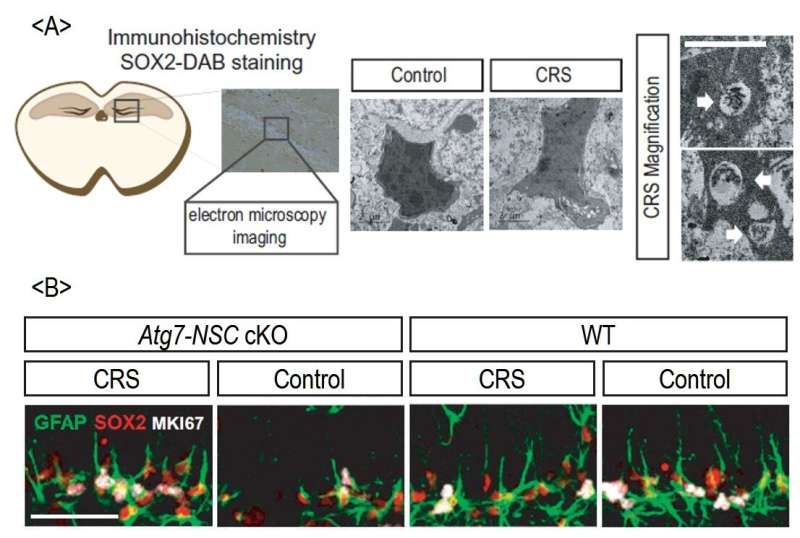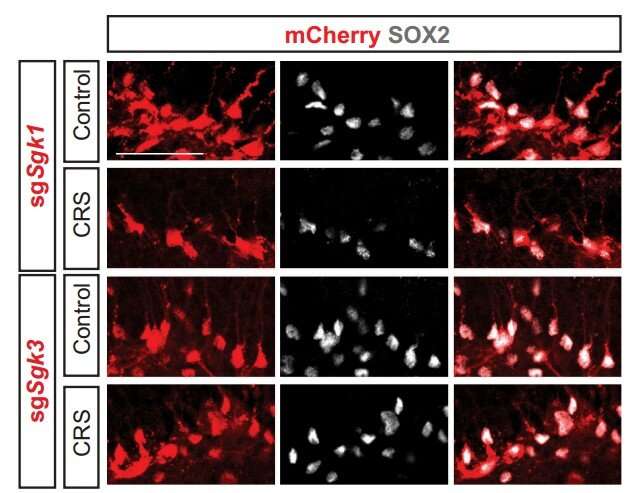Scientists discover how chronic stress causes brain damage

DGIST announced on July 2 that Professor Seong-Woon Yu's team in the Department of Brain and Cognitive Sciences discovered that chronic stress causes autophagic death of adult hippocampal neural stem cells (NSCs). These findings are expected to open up new strategies for combatting stress-associated neural diseases.
Chronic stress is infamous for its association with various mental diseases such as depression and schizophrenia that have become very serious social problems. Stress can even raise the risk of neurodegenerative diseases, such as Alzheimer's disease. However, the exact mechanisms underlying damage of brain functions have not been well known yet. While the previous animal studies found that generation of new neurons is much less in stressed mice, apoptosis, a well-known cell suicide pathway was not found in NSCs, leading to a conclusion that cell death is not related to loss of NSCs during stress. Thus, the cause of decline in adult neurogenesis, which is generation of new neural cells in the adult brain, especially in hippocampus, has remained .
Professor Yu's team discovered for the first time that chronic stress causes autophagic death of adult hippocampal NSCs. Autophagy (self-eating in Greek) is a cellular process to protect cells from unfavorable conditions through digestion and recycling of inner cell materials, whereby cells can remove toxic or old intracellular components and get nutrients and metabolites for survival. However, autophagy can turn into a self-destruction process under certain conditions, leading to autophagic cell death. Autophagic cell death is a form of cell death distinguished from apoptosis by the causative role of autophagy for cell demise. Using NSCs derived from rodents and genetically-modified mice, the research team discovered that the death of hippocampal NSCs is prevented and normal brain functions are maintained without stress symptoms when Atg7, one of the major autophagic genes, is deleted.

The research team also further examined the mechanism controlling the autophagy induction of NSCs in more depth, proving that SGK3 (serum/glucocorticoid regulated kinase) gene is the trigger for autophagy initiation. Therefore, when SGK3 gene is removed, hippocampal NSCs do not undergo cell death and are spared from stress.
Professor Yu in the Department of Brain and Cognitive Sciences said, "It is clear from our study that cognitive defects and mood disorders brought about by stress are through autophagic death of adult hippocampal NSCs. With continuous research, we'll be able to take a step further toward the development of effective treatment of psychological disorders such as depression and anxiety. Furthermore, stress-related neurodegenerative diseases including dementia could be also benefited from our study. We hope to be able to develop much faster and more effective mental disease treatments through joint research with the Chinese National Compound Library to develop SGK3 inhibitor together."
More information: Seonghee Jung et al, Autophagic death of neural stem cells mediates chronic stress-induced decline of adult hippocampal neurogenesis and cognitive deficits, Autophagy (2019). DOI: 10.1080/15548627.2019.1630222














